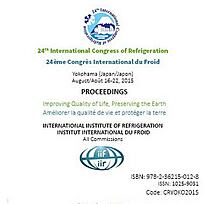
Document IIF
Applicabilité du potentiel de changement de température global (GTP) pour remplacer le GWP dans l'analyse environnementale par le TEWI des systèmes de pompe à chaleur.
Applicability of global temperature change potential (GTP) metric to replace GWP in TEWI environmental analysis of heat pump systems.
Numéro : pap. n. 97
Auteurs : MAKHNATCH P., KHODABANDEH R.
Résumé
Recent legislative measures promote use of environmentally friendly refrigerants to mitigate global warming. Different environmental metrics are used to facilitate decision-making process of selection of refrigerant with low environmental impact. Total equivalent warming impact (TEWI) methodology is able to reflect the effect of heat pump or refrigeration system to global warming by accounting for both direct and indirect emissions associated with the refrigeration system. This paper extends TEWI methodology by using Global Temperature change Potential (GTP) metric instead of Global Warming Potential (GWP) one, which conventionally used to put different emissions on single CO2 scale. The analysis is done for the simple vapour compression heat pump system, where a number of refrigerants are compared. The study concludes with the analysis of applicability of modified TEWI analysis for further refrigerating system environmental assessment studies.
Documents disponibles
Format PDF
Pages : 6 p.
Disponible
Prix public
20 €
Prix membre*
Gratuit
* meilleur tarif applicable selon le type d'adhésion (voir le détail des avantages des adhésions individuelles et collectives)
Détails
- Titre original : Applicability of global temperature change potential (GTP) metric to replace GWP in TEWI environmental analysis of heat pump systems.
- Identifiant de la fiche : 30015245
- Langues : Anglais
- Sujet : Environnement, Généralités
- Source : Proceedings of the 24th IIR International Congress of Refrigeration: Yokohama, Japan, August 16-22, 2015.
- Date d'édition : 16/08/2015
- DOI : http://dx.doi.org/10.18462/iir.icr.2015.0097
Liens
Voir d'autres communications du même compte rendu (657)
Voir le compte rendu de la conférence
-
Status report on heat pumps: a European overvie...
- Auteurs : LAUE H. J.
- Date : 12/1997
- Langues : Anglais
Voir la fiche
-
Optimisations exergétique, économique ou écolog...
- Auteurs : LE GOFF P.
- Date : 06/07/1998
- Langues : Français
- Source : Thermodynamics, heat and mass transfer of refrigeration machines and heat pumps. Proceedings of the EUROTHERM Seminar 59./ Thermodynamique et transferts de chaleur et de masse dans les machines à froid et pompes à chaleur. Comptes rendus du séminaire EUROTHERM 59.
Voir la fiche
-
Uncertainty of life cycle climate performance (...
- Auteurs : MAKHNATCH P., KHODABANDEH R.
- Date : 21/08/2016
- Langues : Anglais
- Source : 12th IIR Gustav Lorentzen Conference on Natural Refrigerants (GL2016). Proceedings. Édimbourg, United Kingdom, August 21st-24th 2016.
- Formats : PDF
Voir la fiche
-
Hladenje i odrzivi razvoj.
- Auteurs : BILLIARD F.
- Date : 04/12/2002
- Langues : Serbe
- Source : Toplotna energija u sadasnjim ekonomskim i ekoloskim uslovima. 33. Kongres o klimatizaciji, grejanju, hladenju. Zbornik radova.
Voir la fiche
-
Burning velocity of 1,1-diflurorethane (R-152a).
- Auteurs : LINTERIS G. T.
- Date : 25/06/2006
- Langues : Anglais
- Source : ASHRAE Transactions. 2006 Annual Meeting, Quebec City, Canada. Volume 112, part 2 + CD-ROM.
Voir la fiche
